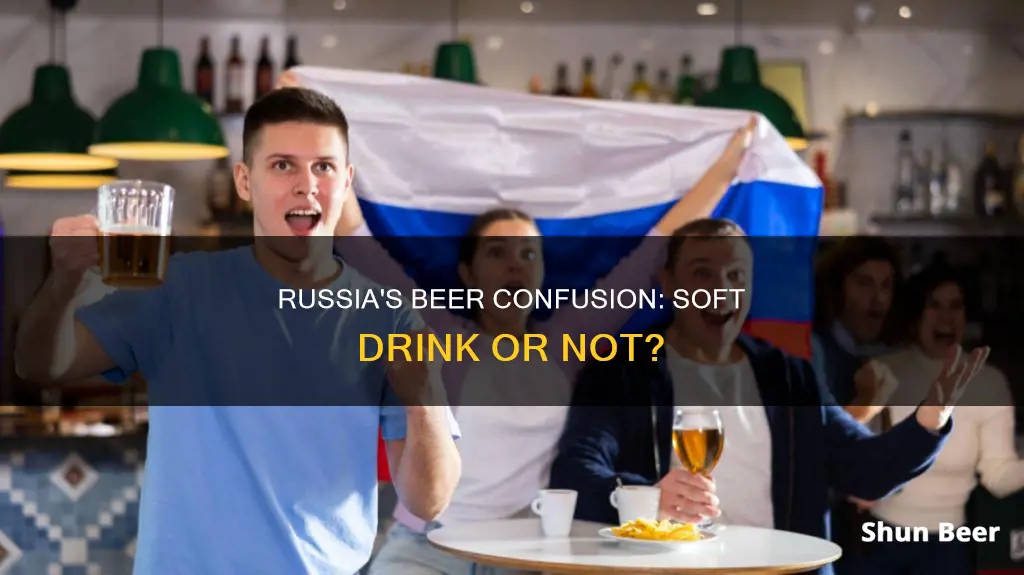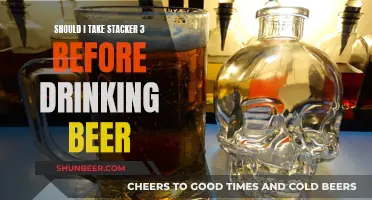
Before 2011, beer in Russia was not classified as an alcoholic drink. Any beverage containing less than 10% alcohol was considered a foodstuff, and its sale was not regulated in the same way as stronger alcoholic drinks. This meant that beer was widely available and could be purchased at corner shops, street vendors, kiosks, petrol stations, and railway stations. It was also common to see people consuming beer in public spaces and on the street as if it were a soft drink. However, in 2011, then-President Dmitry Medvedev signed a bill that officially reclassified beer as an alcoholic beverage, bringing it under similar sales and advertising restrictions as spirits. This change aimed to address the growing problem of alcohol abuse in the country, as Russia's alcohol consumption was already twice the critical level set by the World Health Organization.
| Characteristics | Values |
|---|---|
| Year beer was considered a soft drink in Russia | Before 2011 |
| Alcohol percentage of drinks considered as soft drinks in Russia | Less than 10% |
| Reason for the classification | International trade agreement, specifically the Nice Agreement |
| Who uses this classification | The Russian government |
| Year beer was reclassified as an alcoholic beverage in Russia | 2011 |
| Who signed the bill | Then-President Dmitry Medvedev |
| Effect of the bill | Prohibition of drinking beer in streets and parks, ban on sales by sole proprietors from stalls and tents, ban on sales near educational and sports institutions and bus stops, restriction on outdoor and TV advertising, ban on sales from stores between 11 pm to 8 am |
| Purpose of the bill | To counter growing alcohol consumption in Russia |
What You'll Learn

Before 2011, beer was considered a 'foodstuff' in Russia
In Russia, beer is now considered a popular alcoholic drink, tied with vodka as the country's most beloved tipple. However, this wasn't always the case. Before 2011, beer was considered a foodstuff in Russia, and its sale was not regulated in the same way as stronger alcoholic drinks.
This unique classification of beer as food can be traced to Russia's participation in an international trade agreement known as the Nice Agreement. This agreement drew a distinction between strong alcoholic drinks and beer, categorizing them as separate classes of goods. As a result, beer, which typically contains less than 10% alcohol, was not classified as alcohol by the Russian government.
During this pre-2011 era, beer was widely available in Russia, sold in stalls and tents around the clock. It was a common sight to see people drinking beer in public places, including streets and parks, as if they were consuming soft drinks. Beer was marketed by producers as a healthier alternative to spirits, contributing to its soaring popularity.
However, this perception of beer as a soft drink or foodstuff was not universally shared. Spirits producers, for instance, lobbied the Russian government to reclassify beer as alcohol, seeking fair competition in the market. Nonetheless, the Russian government resisted these efforts, maintaining the status quo until 2011.
In summary, while it is a common misconception that Russians considered beer a soft drink before 2011, the reality is more nuanced. While the Russian government classified beer as a foodstuff due to international trade agreements, the general public was aware that beer contained alcohol and was subject to restrictions such as drinking age limits and driving laws.
Digital Beer Rebates: How Do They Work?
You may want to see also

Beer was reclassified as alcohol in 2011
Beer was reclassified as alcohol in Russia in 2011. Before this, beer was considered a soft drink and could be purchased from most corner shops and street vendors and consumed in public places. Beer was widely consumed in Russia, with sales having risen by more than 40% in the decade before 2011. It was commonly seen that people were swigging beer in the streets and parks as if they were drinking soft drinks.
The reclassification of beer as alcohol meant that it would no longer be available in many of the places it once was. Kiosks, petrol stations, and railway stations, which accounted for over 30% of all beer sales, were no longer able to sell beer. The law also prohibited drinking beer in streets and parks, restricted advertising, and banned sales near educational institutions, sports facilities, and bus stops.
The change in classification was the result of a bill signed by then-President Dmitry Medvedev in 2011. The bill was aimed at countering alcohol abuse and reducing the growing alcohol consumption in Russia, which was already twice the critical level set by the World Health Organization. The bill allowed ministers to control the sale of beer in the same way as spirits, and it was expected to bring some order to the sale of beer.
The reclassification of beer as alcohol in Russia had a significant impact on the consumption and sale of beer in the country. It is now rare to see someone drinking beer in public places, and the police would likely intervene if they did. The law also affected the beer industry, with a 200% tax hike on beer products aimed at bringing consumption under control.
The reclassification of beer as alcohol in Russia was a significant step in addressing the country's high alcohol consumption and changing the perception of beer as a soft drink. The new classification brought the regulation of beer sales in line with stronger alcoholic drinks and restricted the places where beer could be purchased and consumed.
Hypoglycemia and Beer: Is It Safe to Drink?
You may want to see also

Beer was marketed as a healthier alternative to spirits
In Russia, beer was previously considered a soft drink and was widely consumed and easily accessible. However, in 2011, a significant shift occurred when President Dmitry Medvedev signed a bill reclassifying beer as an alcoholic beverage. This change aimed to address the growing problem of alcohol abuse in the country, with consumption levels far exceeding the critical level set by the World Health Organization.
Prior to 2011, beer with an alcohol content of less than 10% was classified as a "foodstuff" rather than an alcoholic drink. This classification led to the perception of beer as a soft drink and resulted in unregulated sales and public consumption. It was common to see individuals drinking beer in streets, parks, and public places as if it were a soft drink. The lack of restrictions on beer sales contributed to its soaring popularity, with beer sales in Russia increasing by more than 40% in the years leading up to 2011.
To counter the rising consumption and promote a healthier alternative to spirits, beer was strategically marketed as a healthier option. This marketing strategy contributed to the perception of beer as a softer, less harmful beverage compared to spirits. The narrative of it being a healthier choice gained traction, and as a result, vodka sales experienced a notable decline of nearly 30% during this period.
The alcohol classification of beer in 2011 brought about crucial changes in its regulation and consumption patterns. People were no longer allowed to drink beer in public spaces such as streets and parks. The new law restricted the sale of beer during specific hours, making it illegal to sell between 11 pm and 8 am. These measures were designed to reduce the accessibility and availability of beer, bringing it in line with the regulations governing the sale of spirits.
The reclassification of beer as an alcoholic beverage in Russia had a significant impact on the drinking culture in the country. It not only changed the legal landscape surrounding beer sales and consumption but also played a crucial role in reshaping societal perceptions of beer as a soft drink. The marketing of beer as a healthier alternative to spirits contributed to a growing awareness of the negative consequences of excessive alcohol consumption, encouraging individuals to make more informed choices about their beverage preferences.
Bees and Beer: A Buzzing Friendship?
You may want to see also

Beer sales in Russia rose by over 40% in a decade
Beer sales in Russia have been on a steady rise, with an increase of over 40% in a decade. This surge in popularity can be attributed to various factors, including shifting consumer preferences, emerging trends, and underlying macroeconomic conditions.
Consumer preferences in the Russian beer market have evolved, with a growing inclination towards premium and craft beers. Russians are becoming more discerning and are willing to pay a premium for quality. This shift aligns with global trends, as consumers seek out unique and flavourful options. The rise in popularity of microbreweries and brewpubs exemplifies this trend, as they offer a diverse range of craft beers, attracting enthusiasts eager to explore different styles.
Another contributing factor is the increasing demand for low-alcohol and non-alcoholic beers. Health-conscious consumers are increasingly seeking healthier alternatives, and the beer market is responding to this demand. This trend is in line with the overall decrease in alcohol consumption in Russia compared to previous decades, as people opt for lower-alcohol options.
The Russian government's regulations have also played a significant role in shaping the market. Measures such as restrictions on the sale of high-alcohol content beer and the introduction of excise taxes on imported beer have encouraged the growth of local breweries and supported the domestic beer industry. These policies have contributed to the overall increase in beer sales over the last decade.
Additionally, the long-standing tradition of beer consumption in Russia, coupled with its position as one of the world's leading beer and wine markets, has contributed to the sustained growth. Russia's per capita beer consumption has been increasing since 2017, with an average Russian aged 15 and older consuming around three litres of beer annually. This figure, however, is lower than the peak consumption of nearly 4.7 litres in 2008.
In conclusion, the rise in beer sales in Russia by over 40% in a decade can be attributed to a combination of factors, including changing consumer preferences, emerging trends in the market, local special circumstances, and macroeconomic factors. The Russian beer market is expected to continue its upward trajectory, driven by the demand for premium and craft beers, as well as low-alcohol and non-alcoholic options.
Beer in Baking: The Secret to Perfect Crusts and Doughs
You may want to see also

Beer is now restricted from being sold in unlicensed kiosks
The new law, which came into effect in 2013, means that beer can no longer be sold in many locations, including kiosks, petrol stations, and railway stations. These locations accounted for over 30% of all beer sales, and the change has been unpopular with some Russians who are no longer able to buy beer on the go. The law also bans the sale of beer from stores between 11 pm and 8 am and restricts its advertising.
The reclassification of beer as alcohol was likely a response to the increasing popularity of beer in Russia. Beer sales had risen by more than 40% in the decade before the law was passed, while vodka sales fell by nearly 30%. Beer was often consumed in public places, such as streets and parks, and was marketed as a healthier alternative to spirits. The Russian government was concerned about the high levels of alcohol consumption in the country, which was twice the critical level set by the World Health Organization.
The impact of the law has been significant. Drinking beer in public is now a rare sight, and the police will intervene if they see it happening. The law has also had economic consequences, with a 200% tax hike on the Russian beer industry and a 5.1% reduction in beer production in 2010.
The chairman of the Union of Russian Brewers, Isaac Sheps, has argued that the restriction on beer sales may backfire. He predicts that people will stock up on vodka instead of beer, as it is more convenient to buy and store. This would result in increased vodka consumption, which was the opposite of President Medvedev's intention when he approved the restriction.
Beer and Flu Medication: A Safe Mix?
You may want to see also
Frequently asked questions
Yes and no. While beer was not officially classified as alcohol until 2011, Russians did not consider it a soft drink either. Before 2011, beer was considered a "foodstuff" and was sold and marketed as a healthier alternative to spirits.
In 2011, then-President Dmitry Medvedev signed a bill that officially classified beer as an alcoholic beverage in Russia. This allowed ministers to control the sale of beer in the same way they did spirits.
The reclassification of beer in Russia was likely a response to the increasing popularity of beer in the country. Over the past decade, beer sales in Russia had increased by more than 40%, while vodka sales had decreased by nearly 30%. The Russian government wanted to counter the growing alcohol consumption in the country, which was already twice the critical level set by the World Health Organization.
The classification of beer as an alcoholic beverage has led to several changes in Russia. People are now prohibited from drinking beer in public places such as streets and parks. The sale of beer has also become restricted, with certain places such as kiosks, petrol stations, and railway stations no longer allowed to sell it. Additionally, the advertising of beer has been restricted, and stores are no longer allowed to sell beer during certain hours. These measures have helped to reduce the consumption of beer in Russia.







